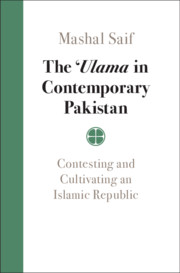Book contents
- The ‘Ulama in Contemporary Pakistan
- The ‘Ulama in Contemporary Pakistan
- Copyright page
- Dedication
- Contents
- Acknowledgments
- Note on Translation and Transliteration
- Introduction
- 1 The Clerics and the Council
- 2 Sovereignty between God and the State
- 3 Questioning State Identity and Legitimacy
- 4 Seeking Security
- 5 Minority Aspirations and the State
- Conclusion
- Bibliography
- Index
Conclusion
Published online by Cambridge University Press: 20 October 2020
- The ‘Ulama in Contemporary Pakistan
- The ‘Ulama in Contemporary Pakistan
- Copyright page
- Dedication
- Contents
- Acknowledgments
- Note on Translation and Transliteration
- Introduction
- 1 The Clerics and the Council
- 2 Sovereignty between God and the State
- 3 Questioning State Identity and Legitimacy
- 4 Seeking Security
- 5 Minority Aspirations and the State
- Conclusion
- Bibliography
- Index
Summary
It was early November 2011, the day before the festival of ‘Id al-Adha, and I was seated in the reception area of Jami‘a Nizamiyya,1 one of the largest Barelawi seminaries in Lahore.2 Across from me sat Rashid Nizami,3 the president of the seminary. Nizami was born in 1971 into a family of religious scholars. After completing the eight-year dars-i nizami course, Nizami graduated with two master’s degrees from Punjab University, a leading public university in the country. One of Nizami’s master’s was in economics, the other in Arabic and Islamic studies. Following the sudden death of his father, the previous president of Jami‘a Nizamiyya, Rashid Nizami assumed the leadership of the seminary in the late 2000s.
- Type
- Chapter
- Information
- The 'Ulama in Contemporary PakistanContesting and Cultivating an Islamic Republic, pp. 279 - 290Publisher: Cambridge University PressPrint publication year: 2020

